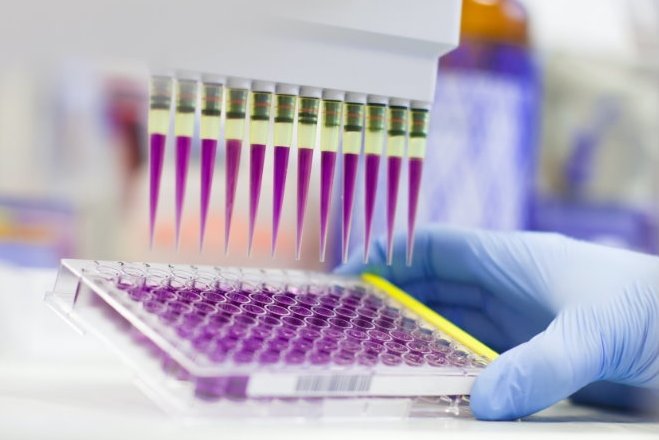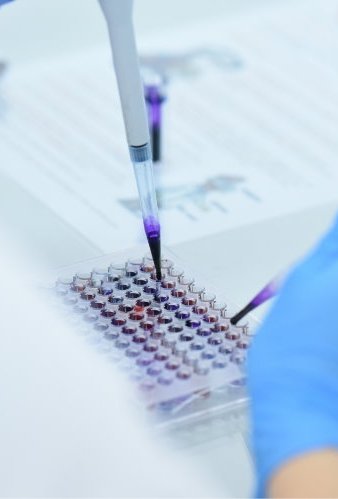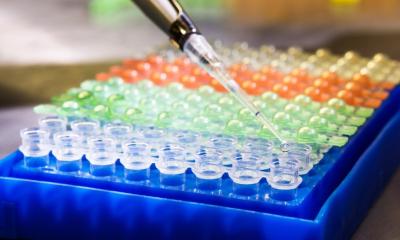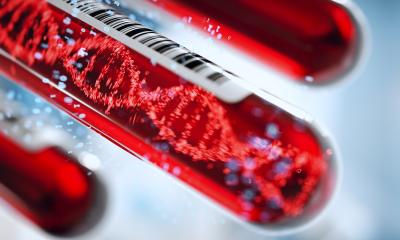
© Grail
Article • Addressing an unmet need
MCED: a simple test for widespread early detection of cancer
Academic labs and biotech firms pioneer multi-cancer early detection with emerging technologies. Screening for multiple cancers with a simple blood or urinary draw could be a game-changer. Two research teams in particular have advanced the field.
Report: Bernard Banga
According to the WHO, cancer is a leading cause of death worldwide, killing nearly 10 million people in 2020. In 2022, four million new cancer cases were diagnosed in Europe alone. Currently established screening tests are type-specific, meaning patients have to be tested for each cancer type individually. This approach has its limitations. First; ‘Existing single-cancer screening tools face several challenges, including lack of adherence to screening recommendations, low positive predictive value or high false positives and missed or interval cancer cases,’ Montserrat Garcia Closas explains. This Spanish researcher and academic, who specialized in identifying cancer biomarkers and the genetic susceptibility of cancer, is the director of the Trans-Divisional Research Program, at the Division of Cancer Epidemiology and Genetics at the National Cancer Institute (NCI) in the US. Additionally, population-scale cancer screening is only recommended for a few cancers in the United States – such as breast, cervical, prostate and lung cancer in high-risk patients and on a per-patient basis. ‘Each of these is screened using a cancer-specific test, e.g., mammography. Eighty percent of cancer deaths involve a type of cancer for which no population screening is currently available in the UK,’ said Peter Sasieni, professor at the Comprehensive Cancer Centre, King’s College London. Sasieni is leading the Cancer Prevention Group which takes a population perspective to research on cancer screening, early detection, and prevention.
New approach to early detection
When cancers are diagnosed early before they have the chance to spread, the overall 5-year survival rate is four times higher that when diagnosed in later stages
Megan Hall
Multi-cancer early detection (MCED) could address an unmet need. It detects a signal by a number of cancers, including cancers not routinely screened for today, to allow for earlier treatment. ‘When cancers are diagnosed early before they have the chance to spread, the overall 5-year survival rate is four times higher that when diagnosed in later stages,’ said Megan Hall, vice-president of Medical Affairs at Grail, a biotech company specialized in MCED based in Menlo Park, California, USA. The principle of MCED is that it searches for traces of a cancerous tumour in a sample of body fluid – for example, blood or urine –, analysing it to trace the origin of the cancer. Most of the technologies under development are blood-based tests, also known as “liquid biopsies”. They highlight either DNA or biomarkers.
Two teams are particularly advanced in this field: one at Chalmers University of Technology based in Gothenburg, Sweden, and another at Grail. The Swedish researchers are currently validating the use of their Miram kit in four studies (Levantis-0087A, Evantis-0093A, Levantis-0065 and Aurorax -0097A) involving over 18,000 participants, while the Californian team is testing its Galleri MCED platform in three studies (Pathfinder, Reflection and Strive) involving 300,000 people.
GAGome levels affected very early in one third of cancers
The first generation MCED platforms rely on sequencing and detecting cancer-derived fractions of cell-free circulating DNA in the bloodstream. The Swedish team opted to study biomarkers. Set up in 2017 by chemical engineer Francesco Gatto, along with Jens Nielsen, a professor of system biology at Elypta AB, a spin-off from Chalmers in Stockholm. ‘We are using free glycosaminoglycan profiles (GAGomes) – carbohydrate macro molecules that appear in blood and urine at the earliest stages of cancer,’ said Nielsen.
The Swedish approach relies on a discovery made ten years ago by Gatto and Nielsen that glycosaminoglycans are excellent biomarkers for non-invasive cancer detection. ‘It appears that about a third of all cancers activate a metabolic programme very early on that severely affects the normal level of GAGomes – in both plasma and urine,’ said Nielsen. His team first developed a kit which uses ultra-high performance liquid chromatography coupled with triple quadrupole tandem mass spectrometry (UHPLC-MS/MS) to identify 17 different free glycosaminoglycan disaccharides. This involved chemistry which combines the physical separation function of liquid chromatography with the mass analysis capabilities of mass spectrometry. The researchers then went on to develop a machine learning in vivo cancer progression model, which uses algorithms to detect changes in glycosaminoglycan carbohydrate macro molecules.
14 different cancer types diagnosed
The Swedish team published a study in the peer-reviewed journal Proceedings of the National Academy of Sciences (PNAS)1 in the context of an international collaboration with university hospitals in Denmark, Canada, Italy and the US. This study looked at free glycosaminoglycan profiles in urine and plasma using 2,064 samples from 1,260 cancer patients and healthy subjects. ‘We observed widespread cancer-specific changes in biofluid GAGomes replicated in an in vivo cancer progression model,’ said Gatto.
The resulting performance may well be sufficient as a one-stop-shop screening program
Francesco Gatto
Elypta’s technique has been shown to be suitable for detecting 14 types of cancer in plasma and urine samples with sensitivity ranging from 41.6 to 73% in detecting stage I cancer at 95% specificity. ‘In contrast, other assays have reported 39-73% sensitivity to stage I cancer,’ Gatto explained. GAGomes doubled the stage I sensitivity reported by state-of the-art genomics biomarkers compared with DNA-based MCED tests. Besides this, Elypta’s technology has ‘helped detect types of cancer not being screened for today and which cannot be detected using DNA-based MCED tests – such as brain and kidney cancers,’ added Gatto, the principal author of the study.
This new assay under development uses a small volume of blood or urine, which makes it more practical and cheaper to use, with a 5-10 times lower cost factor, according to the team at Elypta. The same blood specimen can be used to test for both glycosaminoglycans and genomic biomarkers. ‘This strategy could detect even more cancers than with either method alone, and the resulting performance may well be sufficient as a one-stop-shop screening program,’ said Gatto. In April 2023, Elypta launched an MCED study with Leeds University and Yorkshire Cancer Research to measure metabolic GaGome levels in adults with a high risk of cancer.
Test to predict origin of the cancer signal to guide the diagnostic assessment
For its part, the team from Californian biotech Grail boasts that Galleri is the first test MCED test capable of detecting, through a routine blood draw, more than 50 types of cancer including adrenal cortical carcinoma, uterus, bladder, bone, breast, oesophagus, kidney and lung cancer or plasma cell myeloma. Founded in 2015, Grail is a subsidiary of Illumnia, an American biotechnology company, that provides a line of products and services that serves the sequencing, genotyping and gene expression, and proteomics markets. ‘We use next-generation sequencing and machine learning. Artificial intelligence algorithms can isolate cell-free DNA and analyse methylation profiles to detect the presence of a cancer signal,’ said Megan Hall, vice-president of medical affairs at Grail.

© Grail
Grail has just presented no less than seven oral presentations at the 2023 American Society of Clinical Oncology (ASCO) annual meeting in Chicago in June. These scientific presentations included a large-scale prospective observational cohort study of a group of patients with multiple cancers, a clinical evaluation of the prediction and diagnosis of a cancer signal origin following a MCED test, methylation-based survival prediction for myelodysplastic syndrome, and a real-life early experience of a MCED.
This real-world experience with its Galleri MCED test revealed positive results. ‘Positive Galleri results with a cancer signal origin (CSO) prediction were associated with a diagnosis of invasive cancer across multiple cancer types, including stage I and II cancers,’ said Hall. Clinical surveillance supported Galleri’s ability to detect a cancer signal and predict CSO across multiple cancers. ‘The initial findings support that real-world performance of Galleri is consistent with previous large-scale clinical studies, including the cancer signal detection rate and accuracy of the CSO prediction to guide diagnostic workup.’
First steps towards standards and implementation guidance for MCED technologies
Multi-cancer early detection promises to improve cancer diagnosis, treatment and patient care. However, before integrating MCED technology into clinical care, the benefits and risks must be assessed, as well as potential outcomes, costs and value. ‘Modelling efforts as well as systematic clinical studies and data collection, along with public health and primary care efforts, need to be undertaken to determine whether MCED tests become an opportunity to decrease the heavy burden of cancer for all,’ said Larry Kessler, Professor at the University of Washington School of Public Health in Seattle. Kessler is the deputy chair the Multi-Cancer Early Detection Consortium, a public-private collaboration between organizations in the US and UK committed “to reduce the burden of cancer by evaluating how MCED technologies may improve cancer detection, treatment, and care to benefit all people.” This group of volunteers is comprised of advisors and companies spanning a wide range of expertise in biomarker evaluation and implementation with a special focus on clinical practice, health equity and communication. This consortium is devising guidelines to assess the tests’ utility, population targets for screening or early detection, and downstream actions in health systems. In August 2022, the MCED consortium released its first paper2, establishing the current landscape and plans for future guidance on these technologies. A first step by the international scientific community ‘to help establish standards and implementation guidance for MCED technologies' potential use in clinical care, and to understand and address the impact of these technologies, especially on health equity,’ Kessler stresses.
Literature:
29.01.2024





